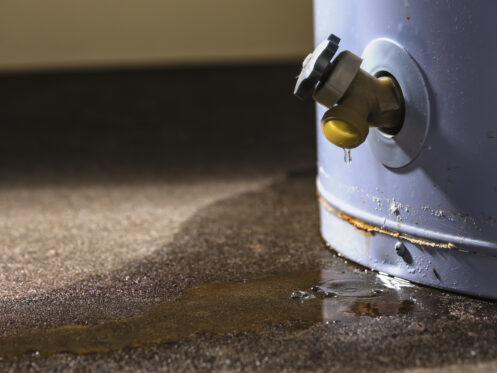If you are struggling with high energy costs, it may be time to consider switching to a tankless water heater. These water heaters are more energy efficient and can provide long-term savings. Here are several reasons why switching to a tankless water heater could be the right decision for you.
Traditional Water Heaters
A standard or traditional water heater stores water in an insulated tank. They come in different sizes that usually hold between 20 and 80 gallons of water, with 40 to 60 gallons being the most common. Cold water enters the tank through a dip tube and is heated at the bottom of the unit with natural gas, propane, or electricity.
With a natural gas or propane water heater, a gas burner heats the water that flows upward in the tank and through a pipe at the top of the unit into the plumbing of your house. The water heater has a thermostat connected to the gas line to set the desired temperature for the water. These heaters keep heating the stored water to maintain the set temperature. They also use a vent to release exhaust gas from the heating process.
Electric units work much in the same way as a gas heater but use an internal electric heating system to heat the water. The hot water will also rise in the insulated tank and into your plumbing. These heaters also run frequently to keep the water at the set temperature. The main difference with electric units is that they need to be plugged into a power outlet.
Both electric and gas water heaters have lower installation and replacement costs and use an existing plumbing system. With their larger tanks, traditional water heaters can provide a high flow rate and serve multiple faucets. One water heater is usually sufficient even for larger homes.
Yet, traditional water heaters tend to result in higher energy bills. These units need to keep reheating the stored water and require more gas or electricity, especially during the winter. Conventional water heaters also require maintenance and usually last only 10 to 15 years.
How Does a Tankless Water Heater Work?
As the name implies, tankless water heaters operate without a storage tank. Traditionally, gas and electric heating tanks store water and continue to heat it to retain a set temperature. Tankless systems provide an alternative on-demand heating method.
When someone turns on the hot water on a faucet, a sensing device in a tankless heater gets activated and the unit directly heats the water. Once the hot water is turned off at the faucet, the sensing unit detects it, stops the water flow, and turns the heating apparatus off. This eliminates the need to store water and keep reheating it.
Like traditional water heaters, tankless heaters use either a gas burner or an electric element to heat the water. The main difference is that the power source heats the water as it travels through a pipe and only operates when hot water is needed. These water heaters usually provide about 2 to 5 gallons of hot water per minute.
Gas and Electric Tankless Water Heaters
Gas-powered tankless water heaters come in several different models that provide flexibility in size and heating power. Whole-house tankless gas water heaters allow you to run multiple water outlets at once. Smaller, point-of-use models are designed to provide hot water to one or two bathrooms.
Gas water heaters provide a solid range of power heating levels, ranging from 130,000 to 380,000 British thermal units (BTU). As a point of reference, one BTU is about equal to the energy of a match burning. The higher the BTU, the more heating power is provided. Tankless gas-powered water heaters provide the BTU power for larger households.
Electric tankless water heaters do not cost as much as electric versions. Their installation and maintenance costs are usually lower too, but they cannot generate as much heating power as gas models. Hence, electric heaters are usually better for smaller households, while gas units work better for larger ones. Installing two tankless heaters is one way to surmount hot water supply issues.
Both gas and electric water heaters are more energy efficient than traditional models. The Department of Energy developed the energy factor (EF) rating for determining a water heater’s energy efficiency. The EF rating for tankless water heaters ranges between .82 and .96 for gas models and up to .99 for electric ones. In comparison, EF ratings of traditional water heaters range from .58 to .70.
EF ratings indicate how much energy is being properly used to heat water and how much is lost. A standard water heater with a .60 EF rating means that about 40% of the heat is wasted. These energy ratings provide a window into the advantages of tankless water heaters.
Advantages of Tankless Water Heaters
Tankless water heaters offer several advantages over traditional water heaters. The first is energy savings. Since tankless water heaters do not need to store water in a tank, they provide a more efficient way of delivering hot water. By directly heating your water only when you turn the faucet on, this system can reduce operating expenses by 30% to 50%.
Tankless water heaters achieve energy savings by providing an on-demand source of hot water. For homes that use up to 41 gallons of hot water per day, these units are typically 34% more energy-efficient than standard models. If your home uses about 86 gallons daily, a tankless heater will likely be about 8% to 14% more efficient than traditional water heaters.
Tankless water heaters also last longer than traditional models. On average, these units last about 5 to 10 years longer than conventional water heaters. Replacing parts on a tankless unit is also easier and can further extend the life of the unit. Although the initial setup costs are higher than standard systems, tankless water heaters provide greater value with their efficiency, which adds up to long-term savings. Some tankless heaters also come with a federal tax rebate to help offset installation costs.
Storage space is another advantage of tankless water heaters. Tankless heaters are smaller than traditional water heaters and are wall-mounted. This advantage comes in handy when space is limited since these units are designed to be compact and space-saving.
A final advantage is that these water heaters are more environmentally friendly than standard models. By using gas or electric power more efficiently, tankless water heaters reduce the amount of fuel used and emissions. Conservation is a benefit that may make a tankless water heater right for you.
Trusted Water Heater Services and More
Please contact us at Environmental Heating & Air Solutions for more information about tankless and traditional water heaters and the best solution for you. We provide plumbing, heating, and air conditioning installation, maintenance, and inspection services to Roseville, CA, and the surrounding area. Call us today!

